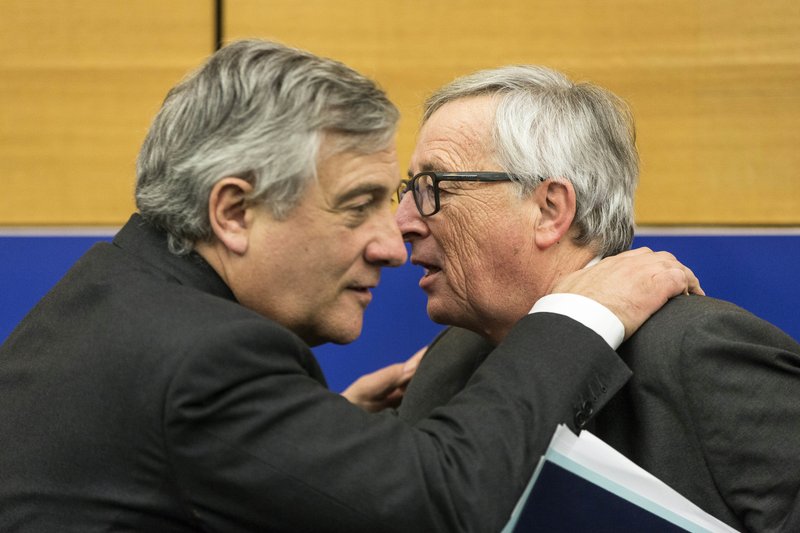LONDON -- European Union leaders Wednesday punctured the United Kingdom's optimism about a smooth and mutually beneficial divorce, declaring that, no matter what British Prime Theresa May thinks, the U.K. can't dictate the terms of the separation.
EU President Donald Tusk warned the U.K. that it will not be able to "pick and choose" the choicest bits of trade and immigration as both sides wade into the negotiations this spring. He said May's speech Tuesday, in which she outlined her plans for moving ahead with the separation, is proof that the EU's united stance is working.
May acknowledged that she would not be able to break the EU's sacrosanct link between free movement of people and of goods, saying the U.K. will leave the bloc's single market in order to regain control over immigration.
Tusk said the concession "proves that the unified position of 27 member states on the indivisibility of the single market was finally understood and accepted by London" even before the negotiations start.
Prime Minister Joseph Muscat of Malta, which holds the rotating EU presidency, insisted that such a trade deal could be negotiated only after the U.K. leaves, which is expected in 2019.
EU Affairs Minister Ann Linde said May had made it "very clear that she wants a very hard Brexit" and anticipated difficult negotiations ahead.
And when British Foreign Secretary Boris Johnson heard about a reported comment from an aide to French President Francois Hollande that Britain should not expect a better trading relationship once it is out of the bloc, he reached for a favorite analogy, World War II.
"If Mr. Hollande wants to administer punishment beatings to anybody who chooses to escape, rather in the manner of some World War II movie, then I don't think that that is the way forward," Johnson said.
Guy Verhofstadt, the European Parliament's lead negotiator on the British exit, tweeted that Johnson's words were "abhorrent and deeply unhelpful" and urged May to condemn them.
May's spokesman, Helen Bower, defended Johnson, saying "he was making a point. He was in no way suggesting that anyone was a Nazi."
EU Commission President Jean-Claude Juncker noted that the EU was "not in a hostile mood" but added it will be tough to negotiate with a longtime EU member that now "will be seen as a third country."
Uncertainty surrounded other aspects of May's speech -- including her promise of a vote for the U.K.'s Parliament on the deal struck with the EU.
May and David Davis, her secretary of state for exiting the EU, declined to answer outright when asked what would happen if lawmakers rejected it.
"They won't vote it down," Davis told the BBC. "This negotiation will succeed."
It remains unclear, though, whether May can formally begin the process of leaving the EU without Parliament's approval. The British Supreme Court says it will give its highly anticipated judgment in a legal battle over the exit negotiations on Tuesday.
The U.K.'s mostly euroskeptic newspapers, meanwhile, seized on May's suggestion that the U.K. could hurt the EU economically if the bloc imposed a punitive deal.
The Times of London headline said "Give us fair deal or you'll be crushed," while the Daily Mirror summarized May's message as "Give us a deal ... or we'll walk."
European newspapers saw the Conservative prime minister's speech as evidence that the U.K. was turning inward.
Germany's Die Welt ran the front-page headline "Little Britain." In a nod to U.S. President-elect Donald Trump, Italy's La Repubblica said: "London gets its wall."
Information for this article was contributed by David Keyton of The Associated Press.
A Section on 01/19/2017
